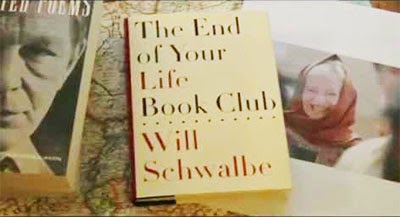The End of Your Life Book Club By Will Schwalbe (published 2013)
As blogger Aimee Levitt so brilliantly summarized: "The End of Your Life Book Club has one of the ickiest premises for a book I've seen in a long time. Will Schwalbe's mother, Mary Anne, is diagnosed with pancreatic cancer and given just a few months to live. In order to pass the time at her chemo treatments, Will and Mary Anne start a two-person book club, choosing a new title to discuss every month.”
What hooked me: Schwalbe and his mother are book people. They are my people. However, I figured out early that we don’t have the same taste in books. More than once I thought, “well, I can skip that one!” The ones he and his mother read interested me not in the least, but I enjoyed their impressions and discussions anyway. Then about halfway through he wrote about a book I had loved, Marilynne Robinson’s Gilead. And later, two more: Elizabeth Strout’s Olive Kitteredge and Muriel Barbery’s Elegance of the Hedgehog. But what he liked about them was different from what I liked about them, and his descriptions wouldn’t have tempted me to read them. Curious. Perhaps his book reviews were less about the books than about him?
Fair enough. I liked him, and I loved his mother. She had lived a fascinating life and was an endearing, delightful character. What more could a reader ask for?
Quote(s) from the book:
“Mom had always taught all of us to examine decisions by reversibility – that is, to hedge our bets. . . . Not the road less traveled, but the road with the exit ramp.”
“One of the many things I love about bound books is their sheer physicality. Electronic books live out of sight and out of mind. But printed books have body, presence. . . . I often seek electronic books, but they never come after me . . . [Electronic books] can get in your head, but they can’t whack you upside it.”
Other books I recommend:
• Age of Miracles (Walker) – What if the Earth’s rotation slowed, goofing up gravity and stretching out days and nights? While the author gets a little tripped up answering that question — character development takes a backseat to setting and situation — she kept me interested. I rather like premises that turn normal on its ear. But be warned that this book is sci-fi. The young narrator is engaging and charming – although you don’t find out until the end from when and where she is telling you about “the early days of The Slowing” – and Walker writes some very lovely sentences. While I didn’t love the ending, it wasn’t a deal-breaker and it didn’t leave me sputtering.
• The Penelopiad (Atwood) – If you read The Odyssey and wondered about Penelope’s side of the story, this is your book. Or just pick it up for Atwood’s wonderful Penelope, who said of Helen of Troy: “I repressed a desire to say that Helen should have been kept in a locked trunk in a dark cellar because she was poison on legs.” Tell me more, Penelope.
Books I flung in the first chapter:
• Longitude: The True Story of a Lone Genius Who Solved the Greatest Scientific Problem of His Time (Sobel) – The author kept telling me how important and fascinating John Harrison’s story was, but I remained un-fascinated.
• The Sense of an Ending (Barnes) – What I took to be an opening quote from Proust’s Remembrance of Things Past turned out to be the actual novel. I persevered for about a chapter before kicking that disc out in favor of Pink Floyd’s “The Wall.” (However, if you like Proust, or Henry James, try it!)
Elaine Rooker Jack is assistant editor of Today's Family magazine.
Elaine Rooker Jack is assistant editor of Today's Family magazine.




0 comments:
Post a Comment